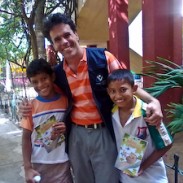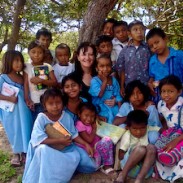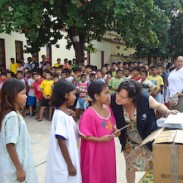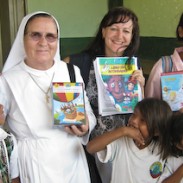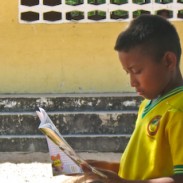You are here
La Guajira Proyect – Bogota, Colombia
Marcos and Joy Alvaro
Far removed from the central highway and a good distance from any town center, we began our hike of several kilometers, under the tropical sun, to Rancherias - a place where the simple and charming inhabitants of Wayúu tribe live. The Wayúu are indigenous people who have maintained their purity and traditions and live in this area of the Colombian Caribbean coast spread over approximately 5.800mi² in Colombia and 4.600 mi² in Venezuela without taking into account the boundaries between these two countries.
It has been very challenging to reach the Wayúu homes as most of the locations are very difficult to access. Those with 4x4 trucks can get there much quicker but must be native experts of the area as it is very easy to get lost because there are no marked roads or highways, just a great rocky desert. There is only the occasional vehicle that passes this way and it is referred to as collectives, and this provides transport for the locals. These collectives leave us at a point in the road and from there we managed to walk to the Wayúu communities.
Some of the ranches have a well located nearby where they can get water, but the majority do not have this precious commodity and must collect rain water in a kind of artificial lagoon. This water, of course, is highly contaminated by the dirt and animals, etc. but it is the only thing they have to drink. They live in extreme poverty and unsanitary conditions; the clothing they wear is usually in very bad condition, while some of them use slippers, the rest walk barefoot. A large majority of the children, starting as young as 5 years of age, sell handicrafts in the streets of the capital making barely enough money to be able to get something to eat before going back to their homes at night.
Since May of 2009, we have had the opportunity to travel to one of the more remote cities of the country, Riohacha, in La Guajira region, Northern Colombia. To access these villages, we must travel by plane, bus, jeep, and chalupa (a conoe-like boat). One of our greatest wishes is to positively influence the lives of the more than 3,500 children through audiovisual materials, and conduct workshops for teachers that help to break mindsets and paradigms that are deeply rooted in their culture.
As the schools have very little resources with which to teach the children, without exception, all of the recipients; parents, teachers, and principals of the schools alike, were very appreciative of the donations we delivered. Sister Celeste, Principal of the Divina Pastora Kindergarten said, “In truth this school is in great need, especially for the values that you implant in the hearts of children. I believe that with this material they (Activated Ministries) gave us, many good things will come for the children, parents and teachers of the school".
For some of the visits we were unable to find transportation since the rains had flooded the roads and blocked the areas. As we could not reach those places, the teachers and children walked all the way to the main road to receive the books, videos and CDs offered through the sponsorship program of Activated Ministries, as well as some school supplies that were donated by friends.
In addition to having wonderful encounters with the children and enjoying unforgettable moments praying, laughing, singing, and playing with them, we were also pleased to have the opportunity to learn about their culture, customs, needs and problems.
Thanks toActivated Ministries’ sponsorship, we were able to donate many DVD sets, books and CDs to these humble ethic schools so that the children can enjoy the beautiful videos and the teachers are equipped with effective materials to teach them morals and values.
